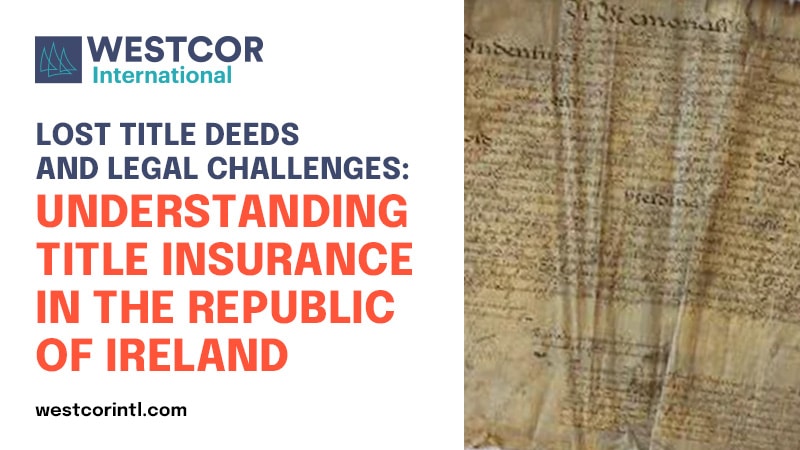Lost Title Deeds and Legal Challenges: Understanding Title Insurance in Ireland
Recent findings from the Legal Services Regulatory Authority (LSRA) underscore the considerable impact of lost title deeds within the Irish property landscape. A notable 778 complaints were filed during a six-month interval in 2022, highlighting title deeds’ critical role in property transactions. The associated costs of reconstituting these lost or missing deeds further emphasise the need for comprehensive protective measures.
In light of the escalating concern over lost title deeds, title insurance has become a pivotal instrument for solicitors and their clients. This insurance serves as a critical safeguard, offering financial protection and legal recourse in scenarios where missing title deeds lead to potential financial losses and legal disputes.
The rising importance of title insurance
For unregistered freehold or leasehold title properties where title deeds have been irretrievably lost, obtaining a registered title with Tailte Eireann becomes challenging without a title bond. If no title bond is in place, a formal application before the Court is required to address the missing deed/s, which can be considerably more expensive and time-consuming than getting a title bond.
“Even in cases where the title is registered, cover for missing instruments may be necessary, especially if Tailte Eireann has lost such instruments and the owner/vendor doesn’t possess a copy. In such instances, the folio is accepted as evidence of title without having to examine the relevant deeds in detail. The offered cover typically follows the same principles as mentioned above.
Illustrative case study:
A cautionary tale To elucidate the practical relevance of title insurance, consider the following case: A mortgage transaction for a Buy To Let property was completed, prompting the Land Registry to raise inquiries regarding the property’s title transfer. A claim was subsequently submitted and accepted.
Subsequent investigations unveiled a scenario wherein the property had been leased for two decades, and various fraudulent activities transpired, including impersonation of the true registered owner.
Factors Considered in Determining Title Insurance Coverage
To avoid the fallout of such cases, solicitors must look to title insurance as a safeguard. However, many aspects of title insurance are misunderstood. With that in mind, when assessing whether Westcor International can offer cover, we take several crucial factors into account:
• Registration: A registered title deed permits the acquisition of an Attested Copy Memorial, summarising the original deed and serving as secondary evidence of its content.
• Ownership tenure duration: The duration of ownership held by the property’s owner/vendor influences the risk assessment linked to missing deeds.
• Age of missing deed: The age of the absent document significantly affects its likelihood of recovery and relevance to the current property status.
• Development impacts: Ongoing property development that could impact its title is a vital consideration during the coverage review process.
Harnessing title insurance’s power
Having amassed extensive experience as a conveyancing solicitor utilising title insurance policies, I can attest to the substantial benefits they offer to clients, notably in safeguarding against the potential risks associated with lost title deeds. If you would like to discuss a specific title issue or to learn more about the range of risks that can be covered in the Republic of Ireland by Westcor, Aisling can be contacted on 086 – 440 3715 or by email on aisling.monahan@wilspeciality.com.






